|
|
|
Sort Order |
|
|
|
Items / Page
|
|
|
|
|
|
|
| Srl | Item |
| 1 |
ID:
190356
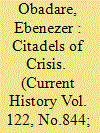

|
|
|
|
|
| Summary/Abstract |
Once highly regarded as centers of excellence, Nigerian universities now uniformly occupy the basement of most global university rankings. At the same time, the nation’s academia is all but shorn of the social prestige that previously attached to it. This essay argues that neither the specific degradation of the professoriate, nor the broader crisis of higher education, can be understood without attention to the crisis of the postcolonial Nigerian state. Accordingly, restorative strategies must take into account the historicity of the crisis, and its insertion into a whirlpool of national, regional, and global forces.
|
|
|
|
|
|
|
|
|
|
|
|
|
|
|
|
| 2 |
ID:
192923
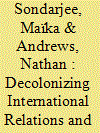

|
|
|
|
|
| Summary/Abstract |
Over the past decade, there has been a new “decolonial turn,” albeit less related than before to land and political independence. “To decolonize” is now associated with something less tangible and often under-defined. We argue that scholars, especially Western ones, should avoid depoliticizing the expression “decolonizing” by using it as a buzzword. Scholars and policymakers should use the expression only if it is closely related to the political meaning ascribed to it by Global South and Indigenous activists and scholars. Decoloniality is a political project of human emancipation through collective struggles, entailing at least the following: 1) abolishing racial hierarchies within the hetero-patriarchal and capitalist world order, 2) dismantling the geopolitics of knowledge production, and 3) rehumanizing our relationships with Others and nature. We conclude that there is a need for epistemic humility and that Western scholars and institutions must refrain from using the word too freely.
|
|
|
|
|
|
|
|
|
|
|
|
|
|
|
|
| 3 |
ID:
189691


|
|
|
|
|
| Summary/Abstract |
Universities played a central role in Egypt’s 2011 revolution and were heavily affected by the subsequent return to military rule. Egyptian universities have a long history as settings where young activists engage in political action. Today they are institutions with a changing role and scope. The expansion of private, for-profit institutions of higher education over the past decade has called into question the traditional model of public universities with access guaranteed by the state, while campuses have been largely silenced as forums of activism.
|
|
|
|
|
|
|
|
|
|
|
|
|
|
|
|
| 4 |
ID:
095252
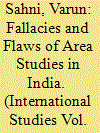

|
|
|
|
|
| Publication |
2009.
|
| Summary/Abstract |
Area studies programmes were established in Indian universities in two waves. The first wave emanated from an individual initiative of Prime Minister Jawaharlal Nehru in 1955 and the second from a committee set up by the University Grants Commission (UGC) in April 1963, soon after India's military defeat at the hands of China in 1962. While a large number of area studies programmes now exist in Indian universities, they have, from their earliest days, been handicapped by four conceptual fallacies and nine operational flaws. The fallacies are related to the subject matter, disciplinary focus, terms of reference and policy relevance, and the flaws are-the absence of theory, lack of multidisciplinary perspectives, analyses that are based on macro-level research, scarce fieldwork, deficiencies in language skills, lack of quantitative research projects, event-driven research agendas, predominance of secondary sources in research, and taught courses which are too broad in their formulation and too narrow in their subject matter. Each fallacy is fundamental; the flaws, taken together, have been fatal for the area studies programmes in India. The article ends with seven suggestions on how these programmes could be revitalized.
|
|
|
|
|
|
|
|
|
|
|
|
|
|
|
|
| 5 |
ID:
193166


|
|
|
|
|
| Summary/Abstract |
The relationship between Strategic Studies and the American academy has always been a tenuous one. Tolerated when fully funded, the field quickly lost its place on campus when it failed to attract grant money. Only with the support of philanthropic foundations did it manage to gain a foothold in American universities. What emerges from our investigation is how the field has feasted during times when foundation money was available and suffered periods of famine when these funds were withdrawn. In addition, we show that during and immediately after the Cold War, the political interests of philanthropic foundations were broadly balanced. By contrast, over the last two decades, the field has been increasingly linked to financial support provided by politically right-leaning foundations. This is happening while funding from more centrist and left-leaning foundations has become much less prominent. When looking ahead at the field’s future health, we cannot but help be concerned about the implications of this development.
|
|
|
|
|
|
|
|
|
|
|
|
|
|
|
|
| 6 |
ID:
123779
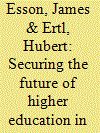

|
|
|
|
|
| Publication |
2013.
|
| Summary/Abstract |
This article reviews the IPPR commissioned report 'Securing the Future of Higher Education in England'. It is argued that the report identifies key shortcomings in contemporary higher education policy, and develops some important recommendations for shaping the sector in the future. However, several of the proposed recommendations would create new divisions in the sector and reinforce existing ones. Moreover, the report maintains and reproduces the ideological status quo of contemporary higher education policy, which can broadly be described as the organisation and provision of higher education along 'quasi-market' lines. Crucially, although the report advocates reform based on social justice, in the contemporary context of fiscal retrenchment, the majority of recommendations are underpinned by, arguably necessary, economic rationales.
|
|
|
|
|
|
|
|
|
|
|
|
|
|
|
|
| 7 |
ID:
161750
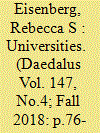

|
|
|
|
|
| Summary/Abstract |
The Bayh-Dole Act of 1980 established a new default rule that allowed nonprofit organizations and small businesses to own, as a routine matter, patents on inventions resulting from research sponsored by the federal government. Although universities helped get the Bayh-Dole Act through Congress, the primary goal, as reflected in the recitals at the beginning of the new statute, was not to benefit universities but to promote the commercial development and utilization of federally funded inventions. In the years since the passage of the Bayh-Dole Act, universities seem to have lost sight of this distinction. Their behavior as patent seekers, patent enforcers, and patent policy stakeholders often seems to work against the commercialization goals of the Bayh-Dole Act and is difficult to explain or justify on any basis other than the pursuit of revenue.
|
|
|
|
|
|
|
|
|
|
|
|
|
|
|
|
|
|
|
|
|